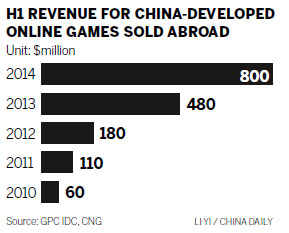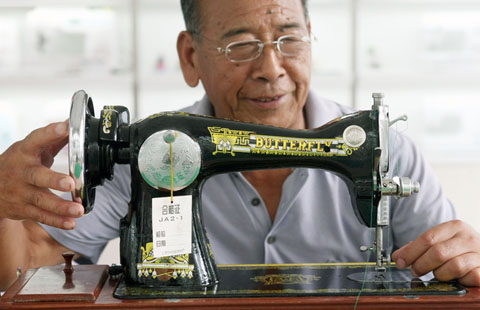Local gaming companies not just playing around the world
By Shi Jing (China Daily) Updated: 2014-08-05 07:19
|
 |
|
Chinese models pose at the stand of Perfect World during the 9th China Digital Entertainment Expo & Conference, also known as ChinaJoy 2011, in Shanghai, China, 28 July 2011. [Photo/IC] |
When Perfect World saw an opportunity for an overseas expansion, it went for it, reports Shi Jing in Shanghai
 Despite some shark-infested waters, Chinese gaming companies that boldly venture into overseas markets are finding that the pros definitely outweigh the cons.
Despite some shark-infested waters, Chinese gaming companies that boldly venture into overseas markets are finding that the pros definitely outweigh the cons.
Take Beijing Perfect World Network Technology Co Ltd for example. When the company first started selling Perfect World II, the international version of its Perfect World multiplayer online game, in 2006, the door to a bigger market was opened.
Over the past eight years, Perfect World has sold its games all over the world. It went public on the Nasdaq in 2007 and acquired a number of overseas companies, such as California-based Cryptic Studios Inc, in 2011.
Like many other companies, Perfect World started off close to home. But over time, the company began to prosper in Europe and the United States, which Xiao Hong, its chief executive officer, defines as true success.
"Going overseas should not be a decision made in haste," Xiao said. "It is a must to hire local talent in an overseas market and grant them enough power and trust to succeed. The company should also build an international network, which requires vision and courage."
Chen Qi, chief operating officer of Beijing's mobile social gaming company FunPlus Game, agreed on the importance of hiring local talent. Half of FunPlus' employees are from overseas, some of whom work in San Francisco and some are from Western Europe.
Apart from selling its products overseas, Perfect World has completed several acquisitions over the past few years. As Xiao explained, the criteria for choosing the right target are simple and
|
|

|
"First of all, the people we are going to work with should be able to accept our culture and share similar values. Second, the product that the target company makes should be able to fit into our business portfolio. Offering a reasonable price is usually the last thing to take into account," he said.
Perfect World did experience some bumps in the road. Japan was a market that was very difficult to penetrate. As Xiao discovered, the Japanese culture is more conservative than China's. As a result, Japanese users were less likely to accept and play games from other countries.
"We are still making attempts in Japan. But we will not give up, for the market is quite huge, and Japanese users are willing to pay for the games they are interested in," he said.
As a result, Perfect World has become more careful with the kinds of games it sells abroad. For example, in Japan, games based on martial arts sell better.
"The game should have something in common with the overseas culture. But when we really reach the market, we make sure the games are localized, not only with the language, but also the technology and the way they are played," said Xiao.
Brian Oh, general manager for the Korea region of London-based cross-platform social games provider King.com Ltd, agreed that Asian companies are confronted with challenges when they go West.
First off, the graphics look different in the eyes of an American player than those of a Chinese player. Therefore, localization is a must. But he also said that Asian developers should not become disheartened. The first target should be finding success in their local markets. Only then should they branch out to overseas markets.
But with a growing number of Chinese gaming companies going overseas, they have become an important driving force for the country's economy. Sales revenue of online games developed in China and sold abroad reached $800 million, up 66.7 percent year-on-year, according to the China Gaming Industry Report released last week during the opening ceremony of the 2014 China Digital Entertainment Expo & Conference in Shanghai.
But more important than the profits being gained is the value that comes with China's culture being exported around the world, Oh said. "Only when the overseas market accepts the culture will consumers be willing to keep paying for the products."
- Sri Lankan calls on firms to ready for China FTA
- Beijing's office rent set to stabilize in H2
- China-style investment policy might resolve land sale row
- Two Chinese firms plan to list on Seoul bourse
- China to punish Chrysler, Audi for anti-trust violations
- China's antitrust body slaps fine on Japanese firms
- Paring off time
- Chinese solar company launches plant in S. Africa














